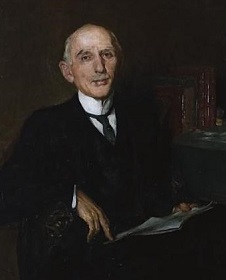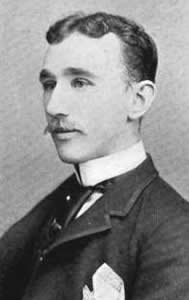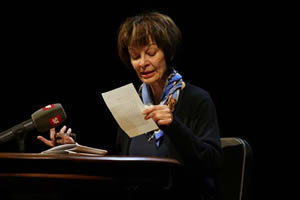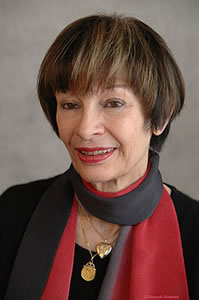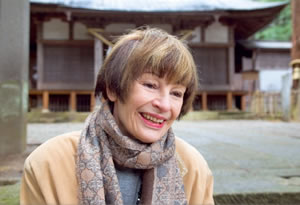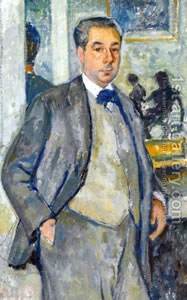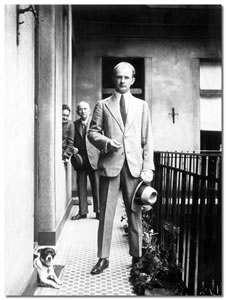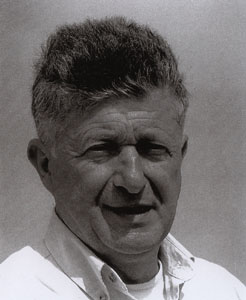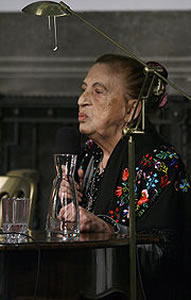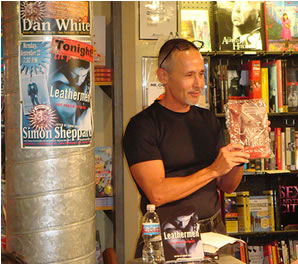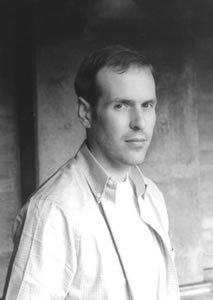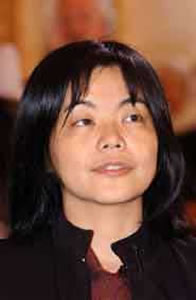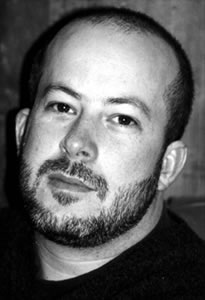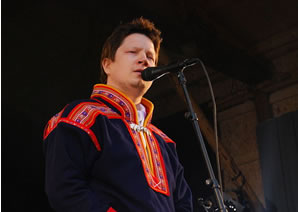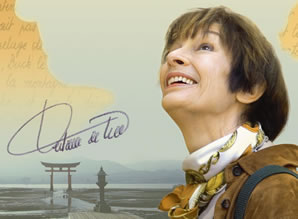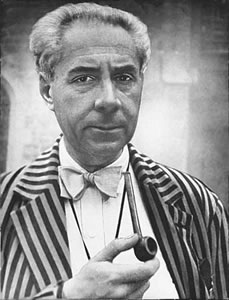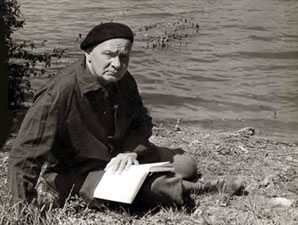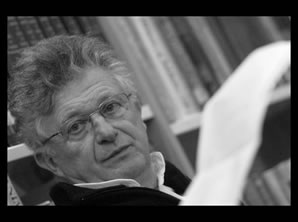De Zwitserse schrijfster Federica de Cesco werd geboren op 23 maart 1938 in Pordenone, Zie alle tags voor Federica de Cesco op dit blog.
Uit: Die Traumjägerin
„Ich habe Pandora getötet«, hatte Night gesagt. Danach: ein langes Schweigen. Die Worte rührten Tumult in mir auf, stießen hart an mein Herz, so dass es in entgeistertem Unverständnis pochte. Das Schweigen hing zwischen uns, zitterte wie eine Kompassnadel, bis ich sagte: »Also, ich kann dir nicht mehr folgen.« Er antwortete nicht; und als das Schweigen andauerte, ging mir allmählich das Unvermeidliche auf. Ich wandte sogar das Gesicht von ihm ab, denn seine Aufrichtigkeit sprang in die Augen. Still wartete er, bis mein Blick zu ihm zurückkehrte. »Erzähl mir, warum.« Er schien weit fort in einem Traum, aus dem heraus er abwesend antwortete. »Sie hat mich darum gebeten.« »Was ist das für eine Geschichte?« Ich fuhr mir mit der Hand über die Stirn. Sein Gesicht war dem offenen Fenster zugewandt, der Straße, tief unten, mit dem brausenden Verkehr. Langsam schüttelte er den Kopf. »Ich lüge nicht.« Eine ruhige Geste bestätigte die Worte. »Es wäre nicht sehr indianisch zu lügen.« Ich lächelte, aber nur halbherzig. Es gab Meerestiefen in jedem Herz, und Strömungen und dunkle Inseln. Ich sagte: »Vielleicht … wenn ich es für möglich halte … dann nur aus Verzweiflung?«
»Wie du sagst: aus Verzweiflung.« Er stand plötzlich auf, nahm die Tassen, goss frischen Kaffee ein, alles ganz ruhig, bevor er sich wieder mir gegenübersetzte. »Weiter«, sagte ich. Er antwortete nachdenklich. Mir fiel plötzlich auf, wie empfindsam sein Gesicht eigentlich war. »Verzweiflung kannst du nicht erklären. Sie kommt über dich, sie erfüllt dich ganz. Dann erst verstehst du sie.« Ich nickte stumm. Er atmete mit einem kleinen Stoß aus. Er hatte immer noch diesen Blick, von aller Welt entrückt. »Ich werde es nie vergessen. Und möchte es nicht noch einmal erleben. Auch nicht im Traum. Ich muss mich da zusammenreißen.« Verstecktes, nicht offen angesprochenes Leid hatte mich schon immer zornig werden lassen. Ich musste plötzlich an Elinor denken und sagte es ihm. »Es ist traurig, aber Träume bringen es am Ende noch fertig, uns verrückt zu machen.« »Elinor«, murmelte er. »Ach ja …« Er trank einen Schluck und begann mit unerwartet ruhiger Stimme zu erzählen. »Also, es war in Seattle, als ich zum ersten Mal von ihr hörte. Elinor spielte eine große Rolle in Pandoras Leben. Sie sprach auch noch von ihr, als wir nach dem Essen eine Bar aufsuchten.”
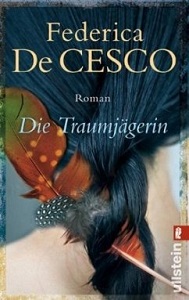
Federica de Cesco (Pordenone, 23 maart 1938)
Cover
De Samische dichter, schilder, musicus en fotograaf Nils-Aslak Valkeapää werd geboren op 23 maart 1943 in Palonjoensuu nabij Enontekiö. Zie alle tags voor Nils-Aslak Valkeapää op dit blog.
The sun’s progress (Fragment)
the wind
blew the clouds to travel
across heaven
the fire to speak
our gods
together with us
the same joy
dreamed dreams
the sun’s progress
along the highways
the moon in the vent-hole
aurora borealis
heaven’s stars
they were the ones who themselves
knew everything
had everything
considered they stood above life itself
our grandmothers
followed time’s signs
taught us
how many months to a year
the guests had one month less
they do not speak nature’s language
birds, birds
we were
twittering of the bird
under blue high heaven
and the wind,
the wind carried along with it
the wind carried away
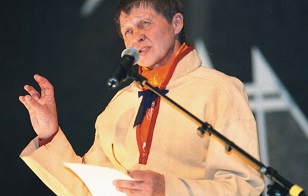
Nils-Aslak Valkeapää (23 maart 1943 – 26 november 2001)
De Amerikaanse schrijver Steven Saylor werd geboren op 23 maart 1956 in Port Lavaca Texas. Zie alle tags voor Steven Saylor op dit blog.
Uit: Roma
“She traveled back and forth, up and down the river path. No single place was home. She liked the seaside, where there was always fish to eat, and the gentle lapping of the waves lulled her to sleep at night. She was less fond of the foothills, where the path grew steep, the nights could be cold, and views of great distances made her dizzy. She felt uneasy in the villages, and was often shy around strangers. The path itself was where she felt most at home. She loved the smell of the river on a hot day, and the croaking of frogs at night. Vines grew amid the lush foliage along the river, with berries that were good to eat. Even on the hottest day, sundown brought a cool breeze off the water, which sighed and sang amid the reeds and tall grasses.
Of all the places along the path, the area they were approaching, with the island in the river, was Lara’s favorite. The terrain along this stretch of the river was mostly flat, but in the immediate vicinity of the island, the land on the sunrise side was like a rumpled cloth, with hills and ridges and valleys. Among Lara’s people, there was a wooden baby’s crib, suitable for strapping to a cart, that had been passed down for generations. The island was shaped like that crib, longer than it was wide and pointed at the upriver end, where the flow had eroded both banks. The island was like a crib, and the group of hills on the sunrise side of the river were like old women mantled in heavy cloaks gathered to have a look at the baby in the crib — that was how Lara’s father had once described the lay of the land. Larth spoke like that all the time, conjuring images of giants and monsters in the landscape. He could perceive the spirits, called numina, that dwelled in rocks and trees. Sometimes he could speak to them and hear what they had to say. The river was his oldest friend and told him where the fishing would be best. From whispers in the wind he could foretell the next day’s weather. Because of such skills, Larth was the leader of the group. “We’re close to the island, aren’t we, Papa?” said Lara. “How did you know?” “The hills. First we start to see the hills, off to the right. The hills grow bigger. And just before we come to the island, we can see the silhouette of that fig tree up there, along the crest of that hill.” “Good girl!” said Larth, proud of his daughter’s memory and powers of observation. He was a strong, handsome man with flecks of gray in his black beard. His wife had borne several children, but all had died very young except Lara, the last, whom his wife had died bearing. Lara was very precious to him. Like her mother, she had golden hair. Now that she had reached the age of childbearing, Lara was beginning to display the fullness of a woman’s hips and breasts.”

Steven Saylor (Port Lavaca, 23 maart 1956)
Cover audioboek
De Hongaarse schrijver Hamvas Béla werd geboren op 23 maart 1897 in Eperjes (tegenwoordig Prešov). Zie alle tags voor Hamvas Béla op dit blog.
Uit: On Friendship (Vertaald door Zsolt Suto)
“However, Aristotle probably is wrong when he says that the possibility of community is created by Philia. The community is not more and is not less. The community is something different. It is an wholly and perfectly and basically different life; an existence, possibility, reality, magic and mysterium. They have found an expression for these days: they say it is the relationship of Me and You. There must be at least three people for a community. But when there are three Philia takes off. The Me and the You makes two, always and only two. More with one than when one is alone and less with one than when one is part of a community. The relationship of Me and You is a circle of existence apart: a specific circle between the individual and the collective. Between loneliness and community. Between aloneness and crowd. Between the One and the Three. This two is the world where Philia thrives.
*
Astrology divides the space of human fate into twelve parts, or in its vocabulary, it divides the stages of human fate into twelve houses. Such houses are personality, wealth, education, home, marriage, etc. and astrology assigns a house apart for friendship, too. In the huge literature of modern psychology one may find not a word on friendship – based on this single fact it seems obvious that astrology has much more refinement to the whole of human existence. Astrology also seems to know that friendship doesn’t have anything to do with the Me nor with love. It designates a house apart for Philia and values its weight and importance the way it values vocation or death. Friendship is not a simple association, just the same way that a friend is not a mere companion. Not a comrade, not a colleague, not a partner. What one experiences in the house of friendship cannot be substituted by any other kind of relationship. A friend cannot be replaced by anything else. There are people incapable of friendship; there are people who are unfit for friendship; there are people who have many other people around them; and there are some, whose life passes in a constant hunger for a friend, without ever finding one.”
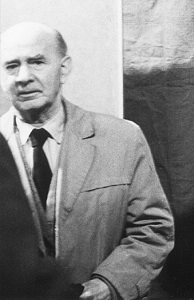
Hamvas Béla (23 maart 1897 – 7 november 1968)
De Franse dichter en schrijver Daniel Biga werd geboren op 23 maart 1940 in Nice. Zie alle tags voor Daniel Biga op dit blog.
CAPITAINE DES MYRTILLES
(disait Emerson de Thoreau)
et moi aussi
j’ai été huissier des chants
appariteur des couleurs
berger d’enfants
et instituteur des caprins et ovins
j’ai été ingénieur des bétons et bitumes
manœuvre des dossiers et paperasses
j’ai eu une chaire associée de gynécologue du cœur
et de pharmacien des âmes
mais c’est toujours jardinier de fourmis et scarabées
brocanteur des mûres et chanterelles
troisième classe des eaux et forêts
que j’ai été parfaitement à l’aise
comme le gardon dans son élément
car il n’y a pas un paysage pas une vie végétale
pas une plante au monde
dont je ne me sois jamais senti l’étranger
mais que dirai-je de l’homme ?
LES RÊVES SE RACONTENT ÀL’OREILLE
miel de père lait de mère œuf du poème
(belle rencontre de miel avec l’ours d’or au festival de Berlin)
l’enfant qui n’aime plus guerre le lait
l’adolescent qui le vend
le poète de quarante ans son œuf de poévie :
dans les rayons le miel se goutte avec le doigt
dans les rayons d’abeilles de propolis de cire les rêves
les rêves se racontent à l’oreille
dans la trilogie de Yussu les films de Semih Kaplanogu
miel –lait-œuf honney-milk-egg hourra ! le réalisme spirituel
hourra ! l’enfant se voit de l’autre côté du miroir
de l’autre bord du torrent il de voit lent faon :
« je bois la lune je bois l’eau de la lune pleine
j’avale la pleine lune tombée dans le seau
je plonge la tête dans l’eau du seau et
j’avale le reflet d’un reflet tombé… »
les rêves se murmurent à l’oreille
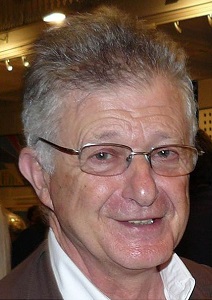
Daniel Biga (Nice, 23 maart 1940)
De Oostenrijkse schrijfster Ceija Stojka werd op 23 maart 1933 geboren in Kraubarth. Zie alle tags voor Ceija Stojka op dit blog.
Uit: Wir leben im Verborgenen
„1939 fuhren wir Rom noch mit Wagen und Pferden frei in Österreich herum. Meine Mutter war damals zweiunddreißig Jahre alt, mein Vater ebenfalls. Wir waren sechs Kinder, die älteste Schwester, Mitzi, war gerade vierzehn, dann kamen meine Schwester Kathi mit zwölf Jahren, meine beiden Brüder Hansi mit elf und Karli mit acht, unser Nesthäkchen Ossi mit sieben und ich selbst, Ceija, mit sechs Jahren. Wir liebten unsere Eltern, und unter uns Geschwistern war das ebenfalls so. Natürlich mussten wir auch, wo immer wir waren, die Schule besuchen. Ich erinnere mich noch an meinen ersten Schultag, mein Vater Wackar brachte mich dahin. Ich war mächtig stolz.
Wir waren damals, 1939, irgendwo in der Steiermark, als meine Leute erfuhren, dass wir nicht mehr umherreisen dürften. Es wurde immer schlimmer für uns, bis mein Vater den Entschluss fasste, nach Wien zu gehen. Er sagte, dass er in Wien einen guten Bekannten habe, einen Fuhrwerksunternehmer, mit einem großen Platz. Vielleicht könnten wir unsere Wohnwagen bei ihm einstellen und dort eine Zeit lang leben. Und so ging es nach Wien, in den sechzehnten Bezirk, in die Paletzgasse zu Herrn Sprach. Dieser Mann nahm uns herzlich auf, doch er sagte zu meinem Vater: »Karl, der Wohnwagen ist zu auffällig, du musst ihn in ein kleines Holzhaus umbauen.« So geschah es dann auch. Wir Kinder kamen wieder in die Schule, meine älteste Schwester Mitzi in eine Papierfabrik. Ossi, der Kleinste, blieb noch bei meiner Mutter Sidi. In diesem großen Hof lebte noch das Ehepaar Brösel in einem kleinen Haus. Sie hatten keine Kinder, aber sie hatten uns sehr lieb. Sie züchteten Hasen, und oft durften Ossi und ich mit Frau Brösel zum Hanselteich, um Gras für die Hasen zu rupfen. Nach der Arbeit gab es dann immer eine gute Jause.
Gleich neben unserem Hof war das schöne Kongressbad, wo wir Kinder uns sehr viel aufhielten, und in der Paletzgasse gab es einen neuen Gemeindebau, der wegen seiner roten Farbe von den Bewohnern Paprikakistl genannt wurde. In diesem Neubau wohnte die Patin meiner Schwester Kathi. Wir nannten sie Gusti-Godl. Sie war einfach ein Sonnenschein. Sie versteckte uns vor den Nazis, wann immer sie die Möglichkeit dazu hatte.“
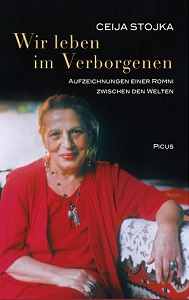
Ceija Stojka (Steiermark, 23 maart 1933)
Cover

